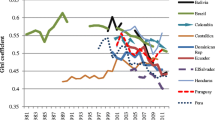Abstract
A core prediction of the Development Theory was that the informal sector in developing economies would rapidly decline with growth. In reality, the informal sector declined very slowly even in fast-growing, developing economies and still remains huge. This is because the governments invested in the informal sector (which incorporated agriculture) to pre-empt the possibility of a stagnant agriculture choking the growth of the formal sector and increasing impoverishment. The sector’s growth implied substantial improvement in employment conditions for the bulk of the workforce that it employed. In fast-growing developing economies, the slow decline of informality, therefore, did not mean the deterioration of employment conditions. India’s experience provides good illustrations in this context.



Similar content being viewed by others
Notes
A qualification needs to be added: the reference here is to those colonies in which Europeans did not settle in large numbers.
Boeke (1953).
This is how Lewis (1954) had distinguished between the informal and the formal sectors though he did not use these terms. He called the two sectors traditional and modern.
See Ghose (2010) for an elaborate discussion of the point.
We have checked that the trends would have remained the same had we not excluded “public administration and defence”.
This definition of the informal sector is substantively the same as that provided by the International Conference of Labour Statisticians of 1993.
It is worth recalling a study – Ranis and Stewart (1999) – which distinguished between traditional (or stagnant) and modernizing (or dynamic) components of the informal sector and showed the traditional segment expanding in the Philippines (which had poor economic growth) and the modernizing segment expanding in Thailand (where there was rapid economic growth).
This definition is substantively the same as that given by the International Conference of Labour Statisticians of 2003.
Ghose (2016).
See Ghose (2016) for evidence.
Kucera and Xenogiani (2009) suggest that the trend is fairly general but do not provide any evidence.
See Ghose (2016) for evidence and discussion.
References
Boeke, J.H. (1953), Economics and Economic policy of Dual Societies as Exemplified by Indonesia, Institute of Pacific Relations, New York.
Charmes, J. (2009), “Concepts, measurement and trends”, in J. P. Jutting and J. R. de Laiglesia (ed.). Is Informal Normal ? Towards More and Better Jobs in Developing Countries: Towards More and Better Jobs in Developing Countries, OECD Publishing, Paris.
Farrell, D. (2004), “The hidden dangers of the informal economy”, McKinsey Quarterly, Vol. 3, pp. 27–37.
Ghose, Ajit. K. (2010), “Reinventing development economics”, Economic and Political Weekly, Vol. 45, No.42, pp. 41–50.
Ghose, Ajit. K. (2016), India Employment Report 2016: Challenges and the Imperative of Manufacturing-led Growth, Oxford University Press, New Delhi.
ILO-WIEGO (2013), Women and Men in the Informal Economy: A Statistical Picture (second edition), International Labour Office, Geneva.
Jütting, J.P. and J.R. de Laiglesia, (2009), Is Informal Normal? Towards More and Better Jobs in Developing Countries, OECD, Paris.
Jütting, J.P. and J.R. de Laiglesia (2009), “Employment, poverty reduction and development: what’s new?”, in Jütting and Laiglesia, (ed.), Is Informal Normal? Towards More and Better Jobs in Developing Countries, OECD, Paris.
Kaldor, N. (1967), Strategic Factors in Economic Development, Cornell University Press, Ithaca, New York.
Kalecki, M. (1972), “Problems of financing economic development in a mixed economy” in M. Kalecki, Selected Essays on the Economic Growth of the Socialist and the Mixed Economy, Cambridge University Press.
Kanbur, R. (2009), “Conceptualising informality: regulation and enforcement”, Indian Journal of Labour Economics, Vol. 52, No. 1, pp. 33–42.
Kanbur, R. (2014), “Informality: causes, consequences and policy responses”, Paper prepared under K. N. Raj Memorial National Fellowship Scheme, Department of Economic and Policy Research, Reserve Bank of India.
Kucera, D. and T. Xenogiani (2009), “Persisting informal employment: what explains it?”, in Jütting and Laiglesia, (ed.), Is Informal Normal? Towards More and Better Jobs in Developing Countries, OECD, Paris.
La Porta, R. and A. Shleifer (2014), “Informality and development”, Journal of Economic Perspectives, Vol. 28, No. 3, pp. 109–126.
Lewis, W.A. (1954), “Economic development with unlimited supplies of labour”, Manchester School, Vol. 22, No. 2, pp. 139–191.
Majid, N. (2015), “The great employment transformation in China”, Employment Working Paper No. 195, International Labour Office, Geneva.
Perry, G. E., W. F. Maloney, O. S. Arias, P. Fajnzylber, A. D. Mason and J. Saavedra-Chanduvi (2007), Informality: Exit and Exclusion, The World Bank, Washington DC.
Ranis, G. and F. Stewart (1999), “V-goods and the role of the urban informal sector in development”, Economic Development and Cultural Change, Vol. 47, No. 2, pp. 259–288.
Author information
Authors and Affiliations
Corresponding author
Rights and permissions
About this article
Cite this article
Ghose, A.K. Informality and Development. Ind. J. Labour Econ. 60, 1–16 (2017). https://doi.org/10.1007/s41027-017-0080-5
Published:
Issue Date:
DOI: https://doi.org/10.1007/s41027-017-0080-5




